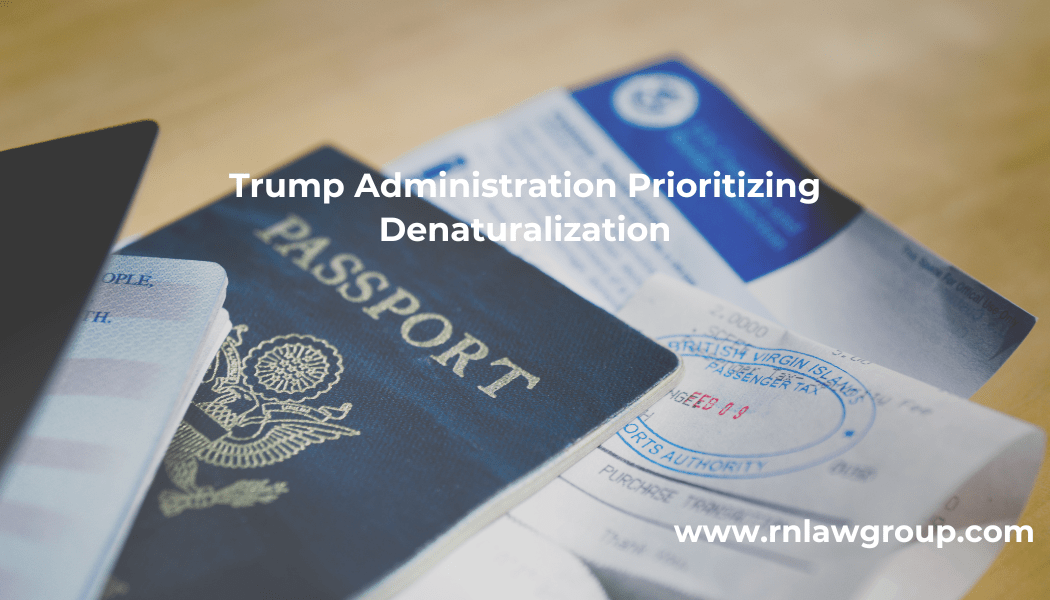
Trump Administration Prioritizing Denaturalization
A new memo from the Department of Justice (DOJ), issued on June 11, 2025, has raised serious alarm among civil rights and immigration advocates. It names denaturalization, the process of stripping someone of their U.S. citizenship, as a top enforcement priority. While this practice is legal under existing immigration law, it has traditionally been used only in rare and extreme cases, such as those involving war crimes or terrorism. Between 1990 and 2017, only 305 denaturalization cases were pursued, averaging about 11 per year. Under President Trump’s first term, the number of denaturalization referrals increased by 600%, and now his administration is moving to expand it even further.
The DOJ’s new policy outlines broad and vague criteria for who might be targeted. These include anyone the department “determines to be sufficiently important to pursue,” individuals deemed a “potential danger to national security,” people allegedly linked to criminal gangs or financial fraud, and even those facing criminal charges, not convictions. This type of language is deeply troubling because it opens the door for the government to use citizenship status as a political tool. In fact, President Trump has already called for the deportation of Zohran Mamdani, a naturalized New York mayoral candidate, and the expatriation of comedian Rosie O’Donnell, who was born in the United States.
What the Law Actually Allows
Legally, the process of denaturalization is complex and difficult for the government to carry out. The Fourteenth Amendment guarantees that no one can lose their citizenship without due process. In most cases, denaturalization begins when U.S. Citizenship and Immigration Services (USCIS) recommends revoking someone’s citizenship, followed by the DOJ filing a lawsuit in federal court. To succeed, the government must prove its case with clear, convincing evidence. If the government brings allegations of fraud in criminal court to denaturalize a citizen, the standard is even higher, proof beyond a reasonable doubt. Under current law, citizenship can only be revoked in very limited circumstances. These include:
- Intentionally lying or hiding key facts during the naturalization process
- Joining certain subversive groups within five years of becoming a citizen
- Being convicted of naturalization fraud
- Dishonorable discharge from the military
- Refusing to testify about subversive activities in narrowly defined situations
Notably, none of the vague priorities in the DOJ memo, like being a “threat” or “sufficiently important” are listed in the law. This means the government could waste time and resources pursuing people who ultimately cannot be legally denaturalized, or it could be testing the limits of its authority beyond what Congress has allowed.
Although much rarer, people born in the U.S. can also lose their citizenship, but only under very specific conditions, such as:
- Committing treason
- Joining a hostile foreign military
- Voluntarily becoming a citizen of another country
Even then, the courts have ruled that the person must have clearly intended to give up their citizenship, and the government must prove it.
Eroding Trust in the U.S. Government
Using denaturalization as a political weapon is not without historical precedent. It was abused in Nazi Germany and during the McCarthy era in the U.S. The Supreme Court has repeatedly cautioned against undermining the stability of citizenship, especially for naturalized individuals. The new policy not only threatens individual rights, but also risks serious harm to civic trust. People could lose their citizenship over minor administrative issues like typos or outdated information. Even worse, many may never get the chance to defend themselves, as denaturalization cases are civil matters where there’s no automatic right to appear in court or to have a lawyer.
Being stripped of citizenship can have devastating consequences, especially for those who are left stateless. Without citizenship, people lose access to basic rights and services and often have nowhere to legally live. The fear generated by this policy may also discourage people from becoming citizens in the first place or from participating in civic life. Over time, that erodes democratic engagement and weakens public confidence in the fairness of our legal system. In a country that prides itself on the strength and stability of its democracy, making citizenship status subject to shifting political winds is a dangerous step backward.
By: Adena Bowman
Adena Bowman is a Senior Associate Attorney at Reddy Neumann Brown PC with over 12 years of experience in U.S. immigration law. She helps clients ranging from small businesses to large multinational corporations bring workers to the U.S. and stay compliant with immigration regulations. She also guides individual clients through employment, investment, and family-based immigration matters. Clients rely on her for clear guidance, strategic planning, and personalized support in navigating complex immigration challenges.

